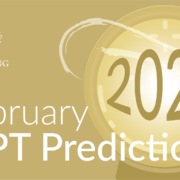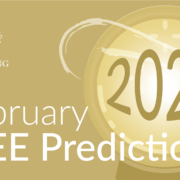JD Advising’s February 2022 MEE Predictions
JD Advising’s February 2022 MEE Predictions
Are you starting to prepare for the February 2022 Uniform Bar Exam? Are you curious as to what subjects might appear on the February 2022 MEE? We have taken a close look at the trends on the MEE and created our February 2022 MEE predictions. Below is a survey of the essay subjects we think are worth extra attention.
Great news! We just put our most popular February bar exam products on sale!! Visit our sales page here to see the deals you can get!
JD Advising’s February 2022 MEE Predictions
If you would like a PDF of our February 2022 predictions, please fill out the form below and we will email it to you (though you can also keep reading if you prefer!):
Disclaimer: You should NOT rely solely on these February 2022 MEE predictions when you study! You should review all subjects when preparing for the UBE exam. All subjects are fair game for the exam. This is just our educated guess on what will appear on the exam, which we do for fun! Sometimes we are right. Sometimes we are not! Please review our free MEE Guide for the highly tested topics and be careful not to ignore any subject! Now, onto our February 2022 MEE predictions.
Note: All the suggested essays noted below can be found for free using the links below. We use the NCBE links for the essays that appeared on the exam from February 2008 through July 2015. We used the Minnesota State Bar links for the essays that appeared on the exam from February 2016 through July 2021. Some essays come from the New York State Bar Examination website.
NEW! Looking for an advantage on the MBE. The NCBE released a new 200-question exam at the end of 2021. Get the 2022 exam in PDF format here!
Agency & Partnership
Agency
UPDATE: TESTED!
Agency was most recently tested in February 2021 and it was combined with Partnership. It is common for Agency to be tested by itself, combined with Partnership, or combined with Torts. This subject is ripe for testing in February 2022 as the Examiners typically alternate between testing Corporations & LLCs and Agency/Partnership.
To get some practice with Agency essays, we recommend taking a look at the following MEEs:
- February 2015 (Respondeat superior)
- February 2017 (Ratification; liability of agent if principal is undisclosed or partially disclosed)
- February 2020 (Actual authority; apparent authority; liability of agent if principal is disclosed; vicarious liability)
- February 2021 (Combined with partnership—employee vs. independent contractor, respondeat superior; vicarious liability: “masters” liable for torts of servants in course of employment; principal not liable for independent contractor’s negligence)
Note: Your review should NOT be limited solely to the essays listed above! Please review our free MEE Guide for the highly tested Agency topics.
Partnership
UPDATE: NOT TESTED!
Partnership was recently tested in February 2021 and it was combined with Agency. However, because the majority of the essay focused on agency law, Partnership is incredibly ripe for testing. October 2020 was the last time Partnership was the primary focus of an essay. It is possible to see a pure Partnership question or an Agency/Partnership crossover.
- July 2009 (General partnership liability; procedure for collection for creditors of the partnership)
- February 2014 (A new partner is not liable for obligations that predated her admission into the partnership; liability when a general partnership transforms into a limited liability partnership)
- February 2018 (Dissolution; fiduciary duties of care and loyalty; withdrawal from partnership)
- February 2019 (Formation of a general partnership; general partnership powers; partners are agents and comanagers of the partnership; dissolution)
Note: Your review should NOT be limited solely to the essays listed above! Please review our free MEE Guide for the highly tested Partnership topics.
Civil Procedure
UPDATE: NOT TESTED!
Civil Procedure was most recently tested in July 2021. While Civil Procedure used to be tested on nearly every exam, it only appeared on one exam in 2020, which was quite surprising. It does have the potential to be tested again in 2022, despite the fact that it has not been as popular lately!
We recommend taking a look at the following MEEs for Civil Procedure:
- July 2012 (Summary judgment; leave to amend)
- July 2013 (Diversity jurisdiction; how to determine an individual’s domicile; how to determine venue for a corporation)
- February 2014 (Discovery—work product; sanctions)
- July 2014 (Intervention as of right; temporary restraining order; preliminary injunction)
- February 2015 (Service of process; diversity jurisdiction; impleader)
- July 2015 (Personal jurisdiction; federal-question jurisdiction; supplemental jurisdiction)
Note: Your review should NOT be limited solely to the essays listed above! Please review our free MEE Guide for the highly tested Civil Procedure topics.
Conflict of Laws
UPDATE: NOT TESTED!
Conflict of Laws was lasted tested in July 2021 and it was combined with Corporations & LLCs. This was the first time this particular crossover appeared. This subject has never been tested by itself. Rather, it is typically combined with Civil Procedure, Decedents’ Estates, or Family Law.
We recommend taking a look at the following MEEs for Conflict of Laws:
- February 2008—Combined with Family Law (enforceability of premarital agreements)
- February 2012—Combined with Civil Procedure (Which state law applies when there is a change of venue; Klaxon rule)
- February 2017—Combined with Family Law (Common law marriage; validity of marriage in one state when recognized in another state)
- July 2019—Combined with Decedents’ Estates (Validity of a will—which state law applies)
- July 2021—Combined with Corporations & LLCs (duties of directors are determined by the state of incorporation, not by a state where the corporation operates or the state where the suit is brought)
Note: Your review should NOT be limited solely to the essays listed above! Please review our free MEE Guide for the highly tested Conflict of Laws topics.
Constitutional Law
UPDATE: NOT TESTED!
Constitutional Law was not tested in July 2021. However, during 2020 Constitutional Law appeared on four of the five exams. Due to the COVID-19 pandemic, five bar exams were administered in 2020 (February 2020, July 2020, two exams in September 2020, and a modified version of the exam in October 2020). We were surprised to see that Constitutional Law appeared on the majority of the exams in 2020. As this subject has become more popular on the essays and was not tested in July 2021, we think it is ripe for testing on the February 2022 bar exam.
Constitutional Law is generally tested by itself on the essays. However, it was recently combined with Civil Procedure in July 2019 and Corporations in July 2020. So, do not be surprised if you do encounter a Constitutional Law essay that also tests an issue from another subject.
Constitutional Law essays typically focus upon nuanced topics, including but not limited to the Dormant Commerce Clause, sovereign immunity, regulatory takings, whether Congress may “commandeer” the states, and the various speech tests under the First Amendment to the United States Constitution.
We recommend taking a look at the following MEEs for Constitutional Law:
- July 2010 (First Amendment—public forum, designated public forum, nonpublic forum)
- July 2011 (Equal Protection Clause; state action)
- July 2012 (Commerce power; sovereign immunity)
- February 2016 (Dormant Commerce Clause)
- July 2018 (Commandeering states)
Note: Your review should NOT be limited solely to the essays listed above! Please review our free MEE Guide for the highly tested Constitutional Law topics.
Contracts
UPDATE: TESTED!
Contracts was most recently tested in February 2021. It is generally tested on two consecutive administrations and then omitted from the essay portion of the following exam. It could definitely show up on the February 2022 MEE.
We recommend taking a look at the following MEEs for Contracts:
- February 2011 (Offer and counteroffer; expectation damages; punitive damages)
- February 2013 (Insecurity; anticipatory repudiation)
- July 2014 (Modification of common law contract and UCC contract; economic duress defense)
- February 2017 (Firm offer; option contract; revocation of offer)
- July 2019 (Expectation damages; consequential damages; duty to mitigate)
Note: Your review should NOT be limited solely to the essays listed above! Please review our free MEE Guide for the highly tested Contracts topics.
Corporations & LLCs
UPDATE: TESTED!
Corporations & LLCs was most recently tested in July 2021. This essay question, however, was a Corporations question combined with Conflict of Laws (a new crossover combination!). It chiefly tested the rules governing the merger of two corporations, dissenters’ rights, and the internal affairs doctrine (the latter two issues have not been frequently tested). Note that LLCs were last tested in September 2020 (and combined with Agency), which makes it more likely for a pure LLCs question to appear on the exam.
Some commonly tested issues include duty of care, duty of loyalty, the business-judgment rule, direct versus derivative actions, piercing the veil, rules concerning directors’ meetings, and LLCs.
We recommend taking a look at the following MEEs for Corporations and LLCs:
- July 2012 (LLCs; direct vs. derivative actions; piercing the LLC veil)
- July 2014 (Shareholder amendment of bylaws; direct vs. derivative actions)
- February 2017 (Shareholder right to inspect corporate records; duty of care; dismissal of a derivative action)
- July 2018 (De facto incorporation; corporation by estoppel; date of corporation’s existence)
- July 2019 (Fiduciary duties of controlling shareholders; dividends; duty of care; duty of loyalty and defenses thereto)
Note: Your review should NOT be limited solely to the essays listed above! Please review our free MEE Guide for the highly tested Corporations & LLCs topics.
Criminal Law & Procedure
Criminal Law
UPDATE: TESTED!
Criminal Law was last tested in September 2020. Criminal Law used to be tested less frequently, but since February 2018, it has appeared on almost every other exam. Criminal Law is generally tested by itself, but once in a while it is combined with Evidence (February 2020) or Criminal Procedure (July 2009). To get some practice with Criminal Law essays, we recommend taking a look at the following MEEs:
- July 2009 (Attempted robbery; abandonment)
- July 2012 (Involuntary manslaughter; legal cause of death; accomplice liability)
- February 2018 (Not guilty by reason of insanity defense; incompetency to stand trial)
- February 2019 (Larceny; embezzlement; burglary; receipt of stolen property)
- September 2020 (homicide: first-degree murder; voluntary manslaughter; defense of others)
Note: Your review should NOT be limited solely to the essays listed above! Please review our free MEE Guide for the highly tested Criminal Law topics.
Criminal Procedure
UPDATE: NOT TESTED!
Criminal Procedure was most recently tested in July 2021 and predominantly focused on the Fourth Amendment (“hot pursuit” exception and the plain view exception) and whether an identification is unnecessarily suggestive pursuant to the Fourteenth Amendment Due Process Clause. It is most commonly tested by itself, but recently it has been combined with Evidence (July 2016, July 2017). Criminal Procedure is rarely tested together with Criminal Law (July 2009). Criminal Procedure is generally tested every two to three administrations.
To get some practice with some Criminal Procedure essays, we recommend taking a look at the following MEEs:
- February 2008 (Fourth Amendment—search and seizure in a Terry context; Fifth Amendment Miranda warnings; Fourteenth Amendment—voluntariness of confession)
- July 2011 (Fourth Amendment—search and seizure; warrant exceptions; Fifth Amendment Miranda warnings)
- February 2014 (Double jeopardy; Sixth Amendment right to jury trial)
- July 2014 (Sixth Amendment right to counsel; Fifth Amendment Miranda warnings)
Note: Your review should NOT be limited solely to the essays listed above! Please review our free MEE Guide for the highly tested Criminal Procedure topics.
Evidence (possibly combined with Criminal Law & Procedure)
UPDATE: NOT TESTED!
Evidence was last tested on the latter of the September 2020 bar exams. Exam takers may see a pure Evidence question. However, Evidence could also be tested in a crossover essay with Criminal Law & Procedure. In July 2016 and July 2017, the Evidence essay question also tested issues from Criminal Procedure. In February 2020, the Evidence essay question also tested issues from Criminal Law.
If there is a crossover with Criminal Law, pay close attention to any crimes or defenses to crimes that may need to be addressed.
If there is a crossover with Criminal Procedure, pay close attention to a suspect’s Miranda rights (most frequently tested!) and a defendant’s Sixth Amendment right to counsel.
We recommend taking a look at the following MEEs for Evidence:
- February 2012 (Policy exclusions)
- July 2014 (Impeachment based on prior convictions and prior bad acts)
- February 2016 (Hearsay; Confrontation Clause; character evidence)
- July 2018 (Hearsay; lay witnesses; expert witnesses; doctor-patient privilege; habit evidence; relevancy)
- February 2020 (nonhearsay: opposing party’s statement; hearsay: then existing mental, emotional or physical condition; relevancy; character evidence; MIMIC evidence; impeachment by conviction and bias)
- July 2020 (Hearsay; doctor-patient privilege; authentication; best evidence rule)
Note: Your review should NOT be limited solely to the essays listed above! Please review our free MEE Guide for the highly tested Evidence topics.
Family Law
UPDATE: NOT TESTED!
Family Law was most recently tested in July 2021. Since July 2012, Family Law has been tested every two administrations or every other administration. Typically, Family Law is tested by itself, but occasionally it is combined with Conflict of Laws.
Family Law essays generally draw from a variety of issues, including but not limited to child custody, spousal support, premarital agreements, property division, the validity of a common law marriage, the Uniform Interstate Family Support Act (UIFSA), and the Uniform Child Custody Jurisdiction and Enforcement Act (UCCJEA). Of late, the Examiners have consistently tested UIFSA, UCCJEA, and other jurisdictional issues, so it is always a good idea to be well versed in these areas.
We recommend taking a look at the following MEEs for Family Law:
- February 2011 (Divorce settlement agreement; child support modification; whether a divorce property division award may be modified)
- July 2011 (Common law marriage; validity of common law marriage in another state; adoption; UCCJEA)
- February 2016 (Premarital agreements; property division upon divorce)
- February 2017 (Common law marriage; validity of common law marriage in another state; property division; bigamy; visitation rights of a party who is not a parent)
- July 2020 (Whether a state may grant a divorce even if there is no personal jurisdiction over other spouse; whether a state may grant custody even if there is no personal jurisdiction over other respondent parent; whether a state may grant property if there is no personal jurisdiction over the respondent; fault-based divorce; best interest of the child factors)
Note: Your review should NOT be limited solely to the essays listed above! Please review our free MEE Guide for the highly tested Family Law topics.
Real Property
UPDATE: NOT TESTED!
Real Property was most recently tested in February 2021. In more recent years, Real Property has been tested on consecutive exams. However, because it was not tested in July 2021, we would not be surprised if Real Property appeared on the February 2022 UBE. Real Property questions tend to be more open-ended in nature and the answers more nuanced than some other subjects.
We recommend taking a look at the following MEEs for Real Property:
- February 2010 (Recording acts; shelter rule; warranty deed)
- February 2013 (Constructive eviction; surrender; duty to mitigate)
- July 2013 (Implied warranty in properties sold by a builder; warranty deed; taking a home “subject to” the mortgage versus assuming the mortgage)
- February 2015 (Adverse possession; warranty deed)
- July 2018 (Zoning ordinance and nonconforming use; future advance mortgage)
Note: Your review should NOT be limited solely to the essays listed above! Please review our free MEE Guide for the highly tested Real Property topics.
Secured Transactions
UPDATE: TESTED!
Secured Transactions last appeared on the MEE in February 2021. Traditionally, Secured Transactions has generally been tested on every other administration, or it is tested consecutively on two administrations and then commonly does not appear on the following exam. We would not be surprised if it appeared on the exam in February 2022.
We recommend taking a look at the following MEEs for Secured Transactions:
- February 2008 (Name on financing statement cannot be seriously misleading; deposit accounts; rights of judicial lien creditor versus a secured creditor)
- February 2016 (Buyer in the ordinary course of business does not take subject to a security interest; consumer to consumer transaction; perfection as to proceeds
- July 2016 (Fixture filing; perfection as to proceeds; default and foreclosure using self-help)
- July 2017 (Attachment of a security interest; account debtor; priority—first to file or perfect)
- February 2019 (Perfection and rules of priority—possession; default; judicial lien creditor rights versus a secured creditor)
Note: Your review should NOT be limited solely to the essays listed above! Please review our free MEE Guide for the highly tested Secured Transactions topics.
Torts
UPDATE: NOT TESTED!
Torts was most recently tested in July 2021. It has appeared less frequently on the bar exam (e.g., did not appear on any of the five bar exams in 2020 or in February 2021). Torts is generally tested by itself, but occasionally, it is combined with Agency. Some of the common issues tested in Torts include negligence; negligence per se; strict products liability; vicarious liability; and battery.
We recommend taking a look at the following MEEs for Torts:
- February 2008 (Strict products liability; res ipsa loquitur)
- February 2011 (Battery; strict products liability; eggshell-skull rule; vicarious liability)
- February 2012 (False imprisonment; negligent infliction of emotional distress; vicarious liability)
- February 2015 (Negligence per se; vicarious liability and indemnification)
- July 2015 (Negligence: premises liability; attractive nuisance; comparative vs. contributory negligence)
Note: Your review should NOT be limited solely to the essays listed above. Please review our free MEE Guide for the highly tested Torts topics.
Trusts
UPDATE: TESTED!
Typically, the Examiners alternate between testing Decedents’ Estates (Wills) and Trusts. Usually, Trusts is tested by itself, but sometimes, it is combined with Wills. Trusts was most recently tested on the latter exam in September 2020, meaning it did not appear on either exam in 2021. Therefore, it is ripe for testing in February 2022.
To familiarize yourself with some of the commonly tested issues in Trusts, we recommend taking a look at the following MEEs:
- July 2011 (Equitable deviation; cy pres)
- July 2012 (Class gifts; termination of a trust under common law and the UPC)
- February 2017 (Amendment of a trust; special powers of appointment; elective share)
- July 2018 (Duties of the trustee—loyalty, diversify, Uniform and Principal Act)
- February 2019 (Discretionary support trust subject to spendthrift clause; duty of loyalty)
Note: Your review should NOT be limited solely to the essays listed above! Please review our free MEE Guide for the highly tested Trusts topics.
Wills (Decedents’ Estates)
UPDATE: NOT TESTED!
Wills was on both the February and July exam in 2021. However, it is more common for the Examiners to test Wills on one exam and then Trusts on the following exam. Wills is most frequently tested by itself, but sometimes it is combined with Trusts (e.g., July 2020) or Conflict of Laws (e.g., July 2019).
To familiarize yourself with some of the commonly tested Wills issues, we recommend taking a look at the following MEEs:
- July 2009 (Undue influence; fraud; general power of appointment; parentelic vs. consanguinity method for intestacy)
- July 2012 (Adopted children; children born out of wedlock)
- February 2016 (Slayer statute; durable power of attorney)
- July 2019 (Holographic will; mistake/ambiguity; antilapse statute; pretermitted child)
- September 2020 (Valid execution of a will; holographic will; codicil; incorporation by reference; dependent relative revocation; mental capacity; mistake/ambiguity)
Note: Your review should NOT be limited solely to the essays listed above! Please review our free MEE Guide for the highly tested Wills topics.
Free or discounted resources
- A five-star UBE course that provides you with the best instruction, outlines, and questions. Preview our course for free here!
- Free popular bar exam guides (on the MBE, MEE, how to pass the bar exam, and what to do if you failed the bar exam) written by bar exam experts!
- Free bar exam webinars taught by top bar exam experts
Other resources
Our most POPULAR and highly rated bar exam resources are:
- Our On Demand and Premium Bar Exam Courses
- Bar exam private tutoring by bar exam experts
- MBE One-Sheets and MEE One-Sheets—rated five stars!
- Real MBE questions—the best practice questions available!
We also have several additional MBE, MEE, and MPT products available.







Leave a Reply
Want to join the discussion?Feel free to contribute!